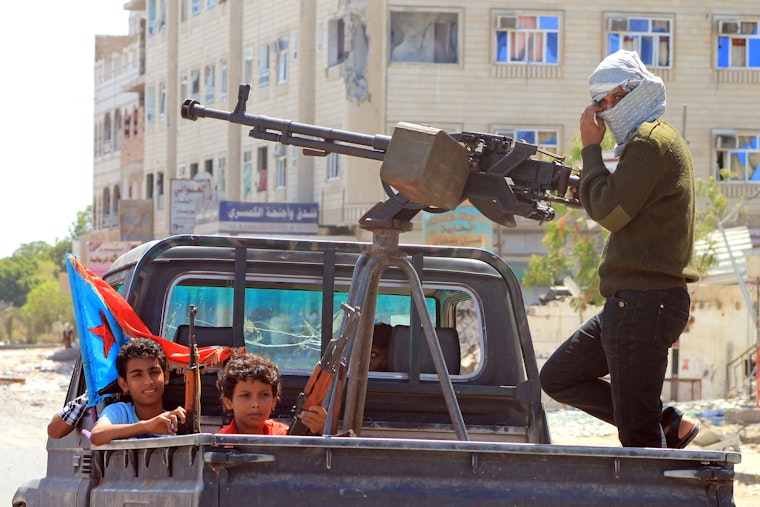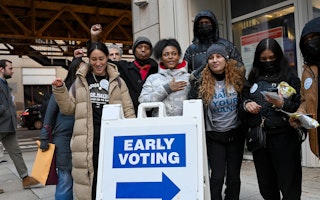In the Fight Against Human Trafficking, Child Soldiers Get Ignored
By Lora Lumpe & Jeremy Ravinsky

In October, the White House organized a cabinet-level meeting to report on steps each agency has taken in the past year to monitor and combat human trafficking. Secretary of State John Kerry said that the effort to end human trafficking was not just a question of morality, but “in our strategic interest, as well.”
Weeks earlier, however, President Obama waived penalties on countries that recruit and use child soldiers, saying that it is in the “national interest” to allow those armed forces to receive more than $270 million in U.S. taxpayer-funded assistance. Pressing children into combat—some as young as 10 years old—is an unambiguous form of human trafficking.
Yet, the reality is that the U.S. government treats child soldiering and human trafficking as distinct phenomena. Child soldiering gets fewer resources and less attention. It is time to close this gap. Antitrafficking organizations and activists must rally to force the next president to combat the recruitment and use of children in warfare as part of a broader effort to eradicate human trafficking and forced labor.
For more than a decade, human trafficking has been a core concern for U.S. foreign and domestic policy. Congress has passed 11 major laws to address the issue and made those laws tougher over the years. In 2000, Congress approved the Trafficking Victims Protection Act (TVPA), which is the centerpiece of U.S. antitrafficking laws. This law requires the State Department to issue an annual report ranking countries on how compliant they are with minimum standards to prevent and combat human trafficking. There are three tiers, with the worst offenders placed on Tier 3, and subject to sanctions on all assistance except humanitarian aid.
TVPA also created other mechanisms to protect victims of trafficking and target traffickers, including the State Department’s Office to Monitor and Combat Trafficking in Persons (TIP), which produces the report every year, and the T visa, which grants U.S. residency to trafficking victims and their families. In addition, it made trafficking a federal crime.
By contrast, the Child Soldier Prevention Act (CSPA) of 2008 gives the U.S. government the authority to penalize governments that recruit and use child soldiers. This law requires the State Department to publish an annual list of countries that have recruited or used child soldiers or have supported armed groups that have done so. The U.S. government is prohibited from giving police or military assistance to any governments on that list.
But the CSPA includes a major loophole: The president can easily waive this prohibition, either in full or in part, when it is deemed to be in the national interest. And every year since the law came into effect in 2010, President Obama has used the waiver. According to the Stimson Center, since 2010, more than $1 billion in assistance and arms sales should have been withheld from foreign governments as leverage to force reforms.
Earlier this year, the State Department identified ten countries that recruit and use children as combatants: Burma, Democratic Republic of Congo, Iraq, Nigeria, Rwanda, Somalia, South Sudan, Sudan, Syria, and Yemen. The prohibition on military aid was exercised in only three cases—Sudan, Syria, and Yemen. The United States had not planned to provide any military assistance to these countries, so this prohibition is not particularly meaningful.
For the rest, full or partial waivers were granted, with only a fraction of prohibited assistance actually withheld. South Sudan, for example, has made the CSPA list since 2010. The United States withheld $1.2 million in aid while earmarking another $99 million for a regime that openly coerces children into combat roles.
This law is the only tool the United States has in place to combat the recruitment and use of child soldiers, and it is a weak one at that.
Unlike sex and labor trafficking, there are no special visas for former child soldiers to come to America, no focus on assistance and rehabilitation of the victims, no visa bans on officials known to recruit and use child soldiers.
Moreover, there is not even a mechanism for linking the CSPA list to the human trafficking tiers. In 2016, Congo, Iraq, Nigeria, and Rwanda all were on the CSPA list, but none of them appeared on Tier 3 of the TIP report—a clear signal that the U.S. treats child soldiers less seriously than sex and labor trafficking.
The United States should be leading the world in the fight against all forms of human trafficking, not effectively ignoring legislation and looking the other way as some foreign militaries prey on children. When the next administration begins, antitrafficking advocates must hold it to account for its efforts—or lack thereof—to combat the problem.
Until March 2020, Lora Lumpe was advocacy director for security sector governance in the Washington, D.C., office of the Open Society Foundations.
Until May 2017, Jeremy Ravinsky was a program assistant for the Washington, D.C., office of the Open Society Foundations.


